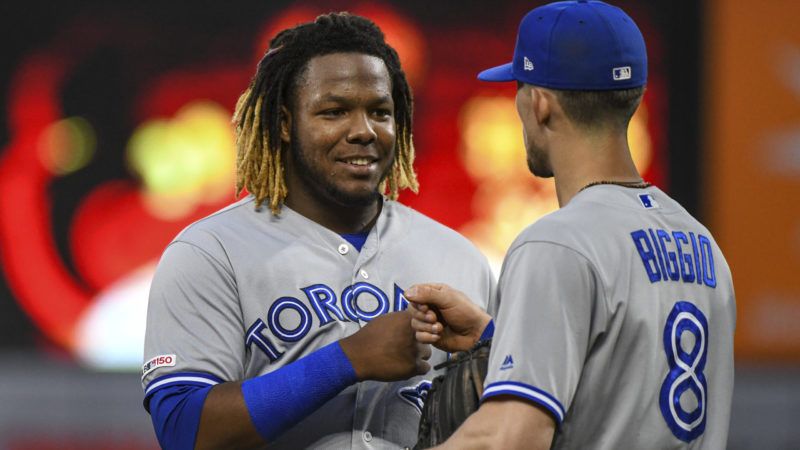What the Toronto Blue Jays' Infielders Can Teach Us About the Inheritance Tax
Some parents with valuable skills will find some way to transmit those skills to their children, and some children will find ways to learn them from parents.

A fact from the world of sports with public policy implications: The Toronto Blue Jays have been starting an infield in which all four players are the sons of major league baseball players.
The Blue Jays first baseman, Vladimir Guerrero Jr., is the son of Vladimir Guerrero, who retired with a .318 career batting average and 449 home runs and was elected to the Hall of Fame in 2018. The Blue Jays' second baseman, Cavan Biggio, is the son of Craig Biggio, who was elected to the Baseball Hall of Fame in 2015 after 20 seasons with the Houston Astros in which he accumulated 3,000 hits, 600 doubles, 400 stolen bases, and 250 home runs. The Blue Jays shortstop, Bo Bichette, is the son of Dante Bichette, a four-time all-star who hit a total of 274 home runs during 14 years in the majors, mostly with the Colorado Rockies. And the Blue Jays third baseman, Travis Shaw, is the son of Jeff Shaw, a two-time all-star who pitched in the major leagues from 1990 to 2001.
It's the second time in recent baseball history this has happened. As the Twitter account MLBStats noted, on June 1, 2012, the Los Angeles Dodgers started Scott Van Slyke, Jerry Hairston Jr., Ivan De Jesus Jr., and Dee Gordon. Scott Van Slyke's father Andy Van Slyke was a three-time all-star over 13 years in the majors. Hairston's "father, uncle, grandfather and brother were all professional baseball players," a 2012 article in the Los Angeles Daily News reported. Ivan De Jesus Sr. also played for the Dodgers. And Dee Gordon's father Tom Gordon had a 21-year career as a major league pitcher.
The pandemic-shortened season is still young. So far, at least, though, the second-generation infield hasn't translated into dominance for the Blue Jays. The Toronto team has a losing record and is at the bottom of the standings in the American League East division. They've been denied a home-field advantage, exiled to Buffalo, New York, by coronavirus-cautious Canadian health officials.
But what is striking to me, in an environment in which inherited privilege is under attack as an affront against equity, is the lack of complaint about the Blue Jays.
The legacy preference for college admissions faces increased criticism. A September 2019 New York Times editorial noted that some in Congress want to outlaw the practice, and concluded, "Preferential treatment for legacy admissions is anti-meritocratic, inhibits social mobility and helps perpetuate a de facto class system. In short, it is an engine of inequity." A January 2020 Washington Post editorial praised John Hopkins for getting rid of its preference for children of alumni. The Post quoted an admissions official at MIT, which says it does not give children of alumni a preference, as saying, "I am not interested in simply reproducing a multigenerational lineage of educated elite."
A June 2020 New York Times op-ed by Lily Batchelder, an Obama administration official who is now a professor at NYU law school, asserted, "We know how to tax inheritances more fairly. We need to act before the massive wealth transfers on the horizon further entrench a hereditary economic elite." It's funny to see arguments against "a hereditary economic elite" in the pages of a newspaper whose publisher is A.G. Sulzberger, the sixth member of the Ochs-Sulzberger family to control the paper since Adolph Ochs acquired it in 1896. The strongest argument for increased inheritance taxes may be that it would liberate heirs from the guilt that too often accompanies the inheritance. But there are ways of achieving that purpose without the use of state force.
The Blue Jays example shows the futility of leveling efforts. In the absence of randomly controlled trials involving adoption and identical twins of professional baseball players, it's impossible to know for sure whether the advantage enjoyed by Vladimir Guerrero Jr. or Cavan Biggio is primarily genetic or environmental, nature or nurture, talent or work ethic. In the end, it doesn't matter. Some parents with valuable skills will find some way to transmit those skills to their children, and some children will find ways to learn them from their parents.
Congress can impose a 100 percent tax on inherited wealth and seize the endowment of any college that offers the slightest admissions preference to children of alumni. But unless the government is going to take children away from parents at birth or outlaw father-son backyard batting practice or after-dinner games of catch, preventing what the levelers decry as a "hereditary elite" is impossible.
That doesn't mean that first-generation ballpayers won't sometimes win, or that some children of Hall-of-Fame baseball players might not be better off going to law school. But it does mean that when fans are finally allowed back into ballparks, rather than booing the Blue Jays infield for reproducing multigenerational lineage of hereditary elites, we can cheer them for exemplifying family values.


Show Comments (56)